<Back to Index>
- General of the National Revolutionary Army Xue Yue, 1896
- General of the National Revolutionary Army Bai Chongxi, 1893
- General of the National Revolutionary Army Wei Lihuang, 1897
PAGE SPONSOR
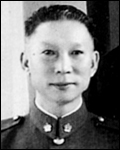
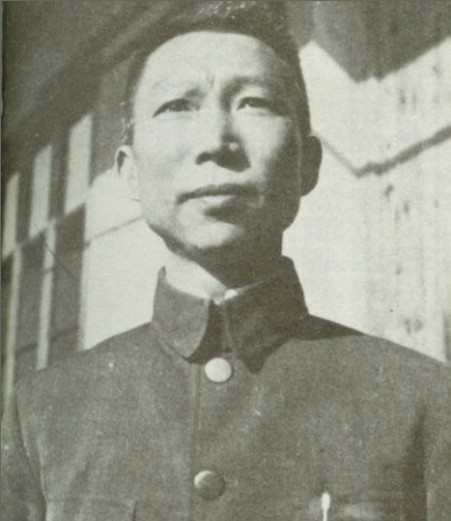
Xue Yue (Chinese: 薛岳; December 26, 1896 – May 3, 1998) was a Chinese Nationalist military general, nicknamed by Claire Lee Chennault of the Flying Tigers as the Patton of Asia.
Born to a Hakka peasant family in Guangdong, Xue joined the army in 1914, at the age of 18. When Chiang Kai-shek formed the Whampoa Military Academy years later, Xue was one of the members of the first graduating class. He was one of the most effective nationalist commanders of the Northern Expedition, and was promoted to command the 4th army after the April 12 Incident. During the first stage of the Chinese Civil War, Generalissimo Chiang Kai-shek ordered General Xue to lead the Cantonese First Army to attack the Chinese communists during the Fifth Encirclement Campaign against the Jiangxi Soviet, forcing them to start the Long March and his forces chased the retreating communists all the way to Sichuan and Guizhou, until the communist forces retreated across the great swamplands and finally escaped to Shaanxi Province. He then turned his forces around and marched unstopped to Central China and defeated the famed Red Army commanders like He Long and Ye Ting of the communist area which they controlled and forced them out of these strongholds. For these accomplishments, Chiang Kai-shek hailed him as "a true example of a Chinese officer".
After the Xian incident, however, Xue's loyalty was in doubt after he offered to personally arrest Chiang Kai-shek and hand him over to the Communists if Chiang refused to fight the Japanese immediately. Although he immediately reconciled with Chiang Kai-shek, his relations with the KMT were strained throughout the Sino - Japanese War. Xue commanded the 19th Army Group that fought the Battle of Shanghai. Later, during the Campaign of Northern and Eastern Honan 1938 (January – June 1938) he commanded the Eastern Henan Army.
Xue was also involved in the Battle of Wuhan, commanding the 1st Army Corps. In the mountains northwest of Wuhan, Xue succeeded in nearly destroying the entire 106th division of the Imperial Japanese Army. During the battle, most of the Japanese officers were killed and the Japanese had to airdrop 300 officers by parachutes into the battlefield. This was the only occasion the Imperial Japanese Army had to use airborne strategy to save a whole division from being eliminated by enemy forces during the Second World War.
Xue Yue was also responsible for the victories of the 9th Front, in the First, Second and Third Battle for Changsha. His forces of the 9th Front were also victorious at the Battle of Changde but were defeated in the Fourth Battle of Changsha.
During World War II, KMT and General Stilwell would not support him and his soldiers ammunition to fight the Japanese due to Stilwell's belief that there was rampant corruption in the KMT Army. To Stilwell's dismay, however, Chennault supplied Xue with ammunition throughout the war. Xue's 9th Front was also responsible for protecting Chennault's air fields. Chennault and Xue became sworn brothers and remained close friends until Chennault's death in 1958.
After World War II, Xue refused to exchange his gold for the Gold Yuan paper currency as mandated by law. When Huang Shaoxiong informed Xue that this was illegal, Xue responded that he and his subordinates' gold was paid in blood and he was personally responsible for it. When Chiang Kai-shek retreated to Taiwan in 1949, Xue was put in charge of defending Hainan Island. The victorious Red Army defeated the demoralized Nationalist Forces. Xue left for Taiwan after the defense of Hainan Island collapsed. He served as a nominal adviser to the chief of staff in name only. He lived until 1998 to the age of 101. He led Chiang's funeral in 1976.
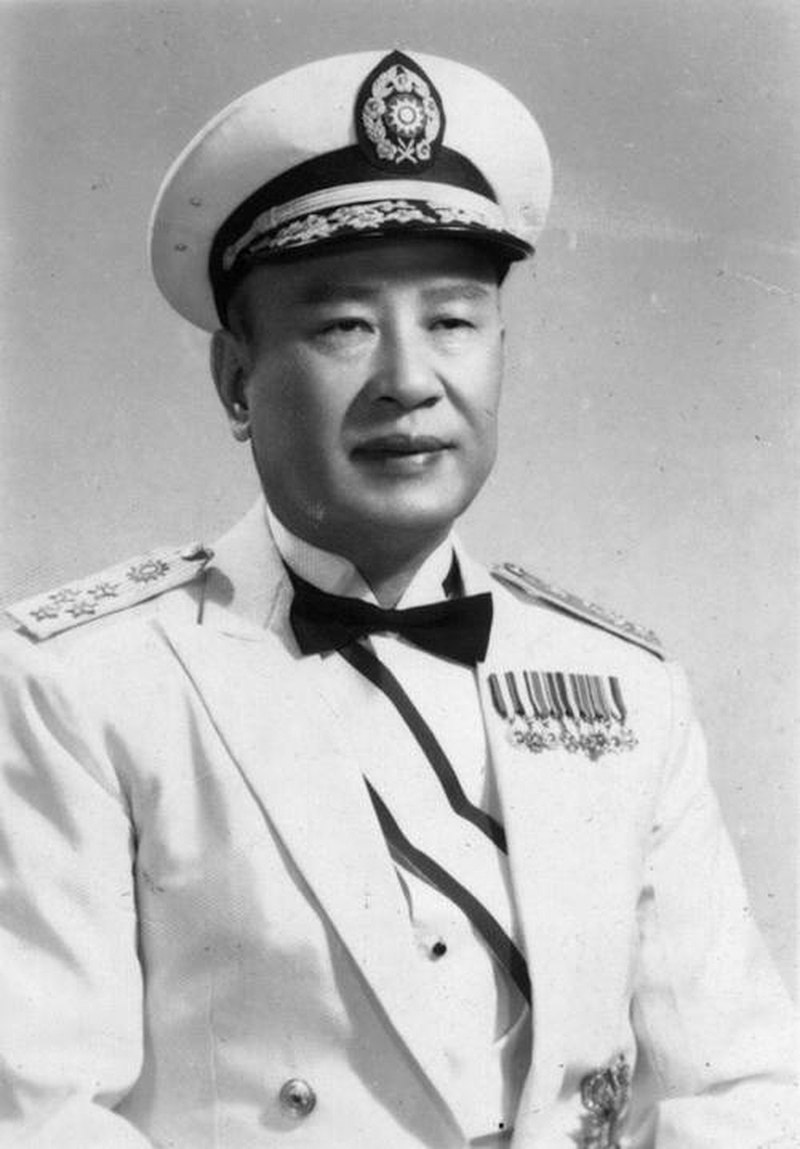
Bai Chongxi (18 March 1893 – 1 December 1966), (simplified Chinese: 白崇禧; traditional Chinese: 白崇禧), also spelled Pai Chung-hsi, was a Chinese general in the National Revolutionary Army of the Republic of China (ROC) and a prominent Chinese Nationalist Muslim leader. He was of Hui ethnicity and of the Muslim faith. From the mid 1920s to 1949, Bai and his close ally Li Zongren ruled Guangxi province as regional warlords with their own troops and considerable political autonomy. His relationship with Chiang Kai-shek was at various times rivalrous and cooperative. He and Li Zongren supported the anti - Chiang warlord alliance in the Central Plains War in 1930, and then supported Chiang in the Second Sino - Japanese War and the Chinese Civil War. He was the Minister of National Defense of the Republic of China from 1946 to 1948. After losing to the Communists in 1949, Bai fled to Taiwan, where he died in 1966.
Bai was born in Guilin, Guangxi and given the courtesy name Jiansheng (健生). He was a descendant of a Persian merchant of the name Baiderluden; the Baidurludens changed their surname to Bai. His Muslim name was Omar Bai Chongxi. He was the second of three sons. His family was said to have come from Sichuan.
At the age of 14, Bai attended the Guangxi Military Cadre Training School in Guilin, a modern style school run by Cai E to modernize Guangxi's military. Bai and classmates Huang Shaohong and Li Zongren would become three leading figures of the Guangxi's military. For a time, Bai withdrew from the military school at the request of his family and studied at the civilian Guangxi Schools of Law and Political Science.
With the outbreak of the Xinhai Revolution in 1911 Bai joined a Students Dare to Die corps. Huang Shaoxiong was its squad commander. After entering the Nanjing enlistment Corps he transferred from the Corps to the Second Military Preparatory School at Wuchang. He graduated from the school in 1914, then underwent pre cadet training for six months before attending the 3rd class of Baoding Military Academy in June 1915. He became a 1st Guangxi division probationary officer upon coming back to Guangxi.
Bai rose to fame during the warlord era by allying with Huang Shaohong (a fellow deputy commander of the Model Battalion of the Guangxi First Division) and Li Tsung-jen as supporters of the Kuomintang leader Sun Yat-sen. This alliance, called the New Guangxi Clique, proceeded to move against the Guangxi warlord Lu Rongting (陸榮廷) in 1924. The coalition's efforts brought Guangxi Province under ROC jurisdiction, and Pai and Li represented a new generation of Guangxi leaders.
During the Northern Expedition (1926 – 1928), Bai was the Chief of Staff of the National Revolutionary Army and was credited with many victories over the northern warlords, often using speed, maneuver and surprise to defeat larger enemy forces. He led the Eastern Route Army which conquered Hangzhou and Shanghai in 1927. As garrison commander of Shanghai, Bai also took part in the purge of Communist elements of the National Revolutionary Army on April 4, 1927 and of the labor unions in Shanghai. Bai also commanded the forward units which first entered Beijing and was credited with being the senior commander on site to complete the Northern Expedition. For many of his battlefield exploits during the Northern expedition, he was given the laudatory nickname Xiao Zhuge, literally meaning "little Zhuge Liang," of the Three Kingdoms fame. Bai was the commander of Kuomintang forces in the Shanghai massacre of 1927, purging and massacring Communists. He allowed Communist leader Zhou Enlai to slip away and escape after placing him under arrest. Western news reports later nicknamed General Bai "The Hewer of Communist Heads".
In 1928, during the Northern Expedition, General Bai led Kuomintang forces to destroy and defeat the Fengtian Clique General Zhang Zongchang, capturing 20,000 of his 50,000 troops and almost capturing Zhang himself, who escaped to Manchuria.
Bai personally had around 2,000 Muslims under his control during his stay in Beijing in 1928 after the Northern Expedition was completed, it was reported by TIME magazine that they "swaggered riotously" in the aftermath. In Beijing, June, 1928, Bai Chongxi announced that the forces of the Kuomintang would seize control of Manchuria, and the enemies of the Kuomintang would "scatter like dead leaves before the rising wind".
Bai was out of money and bankrupted in December 1928. He planned to lead 60,000 troops from east China to Xinjiang province and construct a railroad, as a barrier against Russian encroachment in Xinjiang. His plan was perceived by some to be against Feng Yuxiang.
At the end of the Northern Expedition, Chiang Kai-shek began to agitate to get rid of the Guangxi forces. At one time in 1929, Bai had to escape to Vietnam to avoid harm. From 1930 to 1936, Bai was instrumental in the Reconstruction of Guangxi, which became a "model" province with a progressive administration. Guangxi supplied over nine hundred thousand soldiers toward the war effort against Japan.
During the Chinese Civil War, Bai fought against the Communists. In the Long March, Bai Chongxi allowed the Communists to slip through Guangxi.
Governing his province with capability and aptitude was one of the things Bai was exclusively renowned for in China.
Formal hostilities broke out on 7 July 1937 between China and Japan with the Marco Polo Bridge Incident outside of Beijing. On 4 August 1937, Bai rejoined the Central Government at the invitation of Chiang Kai-shek. During the Second Sino - Japanese War (1937 – 1945), he was the Deputy Chief of the General Staff responsible for operations and training. He was the key strategist who convinced Chiang to adopt a "Total War" strategy in which China would trade space for time, adopt guerrilla tactics behind enemy lines, and disrupt enemy supply lines at every opportunity. When the better armed and trained Japanese troops advanced, the Chinese would adopt a scorched earth campaign in the enemy's path to deny them local supply. Bai was also involved in many key campaigns including the first major victory at the Battle of Tai'erzhuang in Shandong Province in the Spring of 1938 when he teamed up with General Li Zongren to defeat a superior enemy. China managed to check and delay the Japanese advance for several months. Subsequently, he was appointed the Commander of the Field Executive Office of the Military Council in Guilin, with responsibility for the 3rd, 4th, 7th and 9th War Zones. In that capacity he oversaw the successful defense of Changsha, capital of Hunan Province. Between 1939 and 1942, the Japanese attacked Changsha three times and were repelled each time. Bai also directed the Battle of South Guangxi and Battle of Kunlun Pass to retake South Guangxi.
Bai's Guangxi soldiers were praised as a "Crack"(as in elite) army during the war against Japan, and was noted for being an able General who would lead the Chinese resistance should Chiang Kai-shek be assassinated. The majority of Chinese presumed that Chiang Kai-shek, as leader of China, tapped Bai to inherit his position.
In refusing to obey commands from Chiang if they were assumed by himself to be wrong and flawed, Bai Chongxi was alone among fellow military men.
Jihad was declared obligatory and a religious duty for all Chinese Muslims against Japan after 1937 during the Second Sino - Japanese War.
Bai also sheltered the Muslim Yuehua publication in Guilin, which printed quotes from the Quran and Hadith justifing the need for Chiang Kai-shek as leader of China.
Bai promoted Chinese nationalism and uniting Hui to the Han during the war against Japan.
During the war, Bai traveled throughout the Muslim northwestern provinces of China controlled by the Ma Clique and met with Ma Clique Generals to defeat Japanese propaganda.
Following the Surrender of Japan in 1945, the Chinese Civil War resumed in full fledged fighting. In the Spring of 1946, the Chinese Communists were active in Manchuria. A crack People's Liberation Army unit of 100,000 strong under the Communist general Lin Biao occupied a key railroad junction at Siping. Kuomintang forces could not dislodge Lin after several attempts, Chiang Kai-shek then sent Bai to oversee the operation. After some redeployment, the Nationalist forces were able to thoroughly defeat Lin's forces after a two day pitched battle. This was to be the first major victory for the Kuomintang in the 1946 - 1949 stage of the civil war before the fall of mainland China to the Chinese Communists.
In June 1946, Bai was appointed Minister of National Defense. It turned to be a post without power as Chiang began to bypass Bai on major decisions regarding the Chinese Civil War. Chiang would hold daily briefings in his residence without inviting him and began to direct front line troops personally down to the division level, bypassing the chain of command. The Civil War went poorly for the Kuomintang as Chiang's strategy of holding onto provincial capitals and leaving the countryside to the Communists very quickly caused the downfall of his forces which had a 4:1 numerical superiority at the beginning of the conflict.
During the Ili Rebellion, Bai was considered by the government for the post of Governor of Xinjiang. The position later was given to Masud Sabri, a pro - Kuomintang Uyghur leader.
In April 1948 the first National Assembly in China convened in Nanjing, with thousands of delegates from all over China representing different provinces and ethnic groups. Bai Chongxi, acting as Minister of National Defense, debriefed the Assembly on the military situation, completely ignoring Northern China and Manchuria in his report. Delegates from Manchuria in the assembly responded by yelling out and calling for the death of those responsible for the loss of Manchuria.
In November 1948, Bai, in command of forces in Hankow, met with other Generals, Fu Zuoyi, Chang Chih-chung and Chiang Kai-shek in Nanjing on defending Suzhou, the gateway to the Yangzi river valley.
Bai told the Central Political Council of the Kuomintang Central Political Council of the Kuomintang that negotiating with the Communists would only make them more powerful. Governor of Hunan Cheng Qian and Bai reached a consensus that they should impede the advance of the Communists by negotiating with them.
In January 1949, with the Communists bordering on victory, almost everyone in the Nationalist media, political and military command began to demand peace as a slogan and turn against Chiang. Bai Chongxi decided to follow suit with the mainstream current, and defied Chiang Kai-shek's orders, refusing to battle Communists near the Huai River and demanding that his soldiers which were "lent" be sent back to him, so he could secure his hold on the province of Guangxi and ignore the central government in Nanjing. Bai was the Commander of 4 armies in Central China in the Hankow region. He demanded that the government negotiate with the Communists like the others. Bai was in charge of the defense of the capital, Nanjing. He sent a telegram requesting that Chiang Kai-shek step down as President, amid a storm of requests by other Kuomintang military and political figures for Chiang to step down and allow a peace deal with the Communists.
When the Communist General Lin Biao mounted an attack on Bai Chongxi's forces in Hankow, they retreated quickly, leaving the "rice bowl" of China open for the Communists. Bai retreated to Headquarters at Hengyang via a railroad from Hankow to Canton. The railroad then provided access to Guilin where his home was. In August at Hengyang, Bai Chongxi reorganized his troops. In October, as the Canton fell to the Communists, who were almost in complete control of China, Bai Chongxi still commanded 200,000 of his elite troops, making a return to Guangxi for a final stand after covering for Canton.
The riots following the 228 Incident of 28 February 1947, that broke out in Taiwan due to poor governance by the central government appointed officials and the garrison forces, caused many casualties of both native Taiwanese and mainland residents. Bai was sent as Chiang Kai-shek's personal representative on a fact finding mission and to help pacify the populace. After a two week tour, including interviews with various segments of the Taiwan population, Bai made sweeping recommendations, including replacement of the governor, and prosecution of his chief of secret police. He also granted amnesty to student violators of peace on the condition that their parents take custody and guarantee subsequent proper behavior. For his forthright actions, native Taiwanese held him in high regard.
Bai had another falling out with Chiang when he supported General Li Zongren, his fellow Guangxi comrade - in - arms, for the vice presidency in the 1948 general election when Li won against Chiang's hand picked candidate, Sun Fo. Chiang then removed Bai from the Defense Minister post and assigned him the responsibility for Central and South China. Bai's forces were the last ones to leave the mainland for Hainan Island and eventually to Taiwan.
He served Chief of the General Staff since 1927 until his retirement in 1949. After he came to Taiwan, he was the appointed vice director of the strategic advisory commission in the presidential office. He also continued to serve in the Central Executive Committee of the Kuomintang . He reorganized the party from 1950 - 1952.
After the Communist victory, some of Bai Chongxi's Guangxi troops fled to French Indochina where they were detained. Others went to Hainan in retreat.
In 1951, Bai Chongxi made a speech to the entire Muslim world calling for a war against the Soviet Union, claiming that the "imperialist ogre" leader Joseph Stalin was engineering World War III, and Bai also called upon Muslims to avoid the Indian leader Jawaharlal Nehru, accusing him of being blind to Soviet imperialism.
He and Chiang never reconciled and he lived in semi - retirement until he died of cerebral thrombosis on 1 December 1966 at the age of 73.
Bai was then given a military funeral by the government, with a Kuomintang Blue Sky with a White Sun flag over his coffin. Bai was buried in the Muslim section of the Liuzhangli (六張犁) Cemetery in Taipei, Taiwan.
As a Muslim, he was Chairman of the Chinese Islamic National Salvation Federation, and then the Chinese Muslim Association. Bai Chongxi was a board member of the All - China Inter - religious Association, representing Islam, the other members of the board were a Catholic Bishop, Methodist Bishop and the Buddhist Abbot Taixu.
Bai sent his son Pai Hsien-yung to Catholic schools in Hong Kong.
During the Northern Expedition, in 1926 in Guangxi, Bai Chongxi led his troops in destroying Buddhist temples and smashing idols, turning the temples into schools and Kuomintang party headquarters. It was reported that almost all of Buddhist monasteries in Guangxi were destroyed by Bai in this manner. The monks were removed. Bai led a wave of anti - foreign activities in Guangxi, attacking American, European and other foreigners and missionaries, and generally making the province unsafe for foreigners. Westerners fled from the province, and some Chinese Christians were also attacked as imperialist agents.
The three goals of his movement were anti - foreign agitation, anti - imperialism, and anti - religion. Bai led the anti - religious movement against superstition. Muslims do not believe in idolatry and his religion may have influenced Bai to take action against the Idols in the temples and the superstitious practices rampant in China. However, Huang Shaoxiong, also a Kuomintang member of the New Guangxi Clique, supported Bai's campaign, and Huang was not a Muslim, the anti religious campaign was agreed upon by all Guangxi Kuomintang members, so it may have not had anything to do with Bai's beliefs.
As a Kuomintang member, Bai and the other Guangxi clique members allowed the Communists to continue attacking foreigners and idols, since they shared the goal of expelling the foreign powers from China, but they stopped Communists from initiating social change.
British diplomats reported that he also drank wine and ate pork.
Bai Chongxi was interested in Xinjiang, a predominately Muslim province. He wanted to resettle disbanded Chinese soldiers there to prevent it from being seized by the Soviet Union. Bai gave a speech in which he said that the minorities of China were suffering under foreign oppression. He cited specific examples, such as the Tibetans under the British, the Manchus under the Japanese, the Mongols under the Outer Mongolian People's Republic, and the Uyghurs of Xinjiang under the Soviet Union. Bai called upon China to assist them in expelling the foreigners from those lands. He personally wanted to lead an expedition to seize back Xinjiang to bring it under Chinese control, in the style that Zuo Zongtang led during the Dungan revolt. Bai's partner in the Guangxi clique Huang Shaohong planned an invasion of Xinjiang. During the Kumul Rebellion Chiang Kai-shek was ready to sent Huang Shaohong and his expeditionary force which he assembled to assist Muslim General Ma Zhongying against Sheng Shicai, but when Chiang heard about the Soviet Invasion of Xinjiang, he decided to withdraw to avoid an international incident if his troops directly engaged the Soviets, leaving Ma alone with not reinforcements to fight the Red Army. Huang was suspicious of this, suspecting that Chiang feared that the Guangxi clique wanted to take control of Xinjiang rather than leaving it under Chiang's Nanjing regime.
Bai's reputation as a military strategist was well known. Evans Carlson, a United States Marine Corps colonel, noted that Bai "was considered by many to be the keenest of Chinese military men." Edgar Snow went even further, calling him "one of the most intelligent and efficient commanders boasted by any army in the world."
Bai is the father of Kenneth Hsien-yung Pai, Chinese author and playwright now living in the United States. Bai and his wife had ten children, three girls and seven boys. Their names are Patsy, Diana, Daniel, Richard, Alfred, Amy, David, Kenneth, Robert and Charlie. His wife was Ma P'ei-chang, married since 1925.

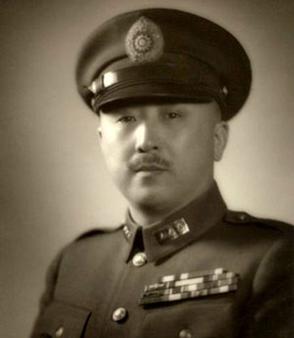
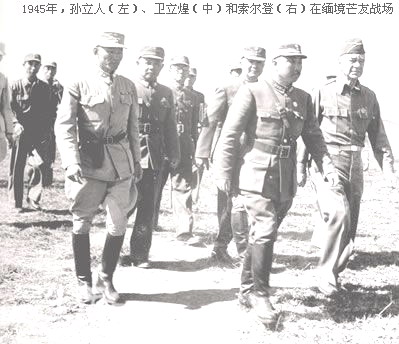
Wei Lihuang (traditional Chinese: 衛立煌; simplified Chinese: 卫立煌) (16 February 1897 – 17 January 1960) was a Chinese general who served the Nationalist government throughout the Chinese Civil War and Second Sino - Japanese War as one of China's most successful military commanders.
First joining the Kuomintang (KMT) during the early 1920s, Wei would rise to become general after the Northern Expedition, a two year campaign to unify China. His later success under Chiang Kai-shek during the Bandit (Communist) Suppression Campaigns from 1930 to 1934 would earn him the nickname "Hundred Victories Wei".
A general during the Second Sino - Japanese War, Wei commanded the First War Area. With the entry of Great Britain and later the United States in the war against Japan, he was transferred to southern China as commander of the Nationalist Chinese XI Group Army. He later replaced General Chen Cheng as commander of the Chinese Expeditionary Forces, known as Y Force. Y-Force consisted of over 100,000 Nationalist soldiers, and participated in major ground operations in support of American General Joseph W. Stilwell's offensive in northern Burma. Unlike many of his contemporaries, Wei was able to work effectively with American commanders.
Beginning his offensive into southern Yunnan on 11 May 1944, Wei's troops captured Tengchung on 15 September after two months of heavy fighting. Proceeding southward despite heavy resistance, his forces eventually linked up with Chinese divisions in Wanting, Burma, on January 27, 1945. The success of this offensive allowed the Allies to reopen the former Burma Road supply network to China through Ledo, Burma, now named the Ledo Road. In concert with existing airlift operations over the Hump, the Ledo Road enabled overland transport of military supplies from India to Nationalist bases in China.
Recalled to northern China to again replace General Chen Cheng following the war, Wei was placed in command of KMT forces in northeast China in October 1947. After being cutoff from land communication with the KMT with the communist capture of Chinchow (Jinzhou 锦州, Liaoning), he was supposedly planning for an offensive to recapture the Nationalist provincial capital before he was ordered to withdraw by Chiang Kai-shek. Shortly before the communist capture of Mukden (Shenyang), Wei would return to southern China following his replacement by his field commander Du Yuming in October 1948.
In spite of Wei's earlier success, his tenure in the northeast was remarkably unsuccessful. He defied orders for more than a year to withdraw, and lost 300,000 troops. Taylor writes that "Of those, "246,000 were captured, and many if not most were quickly incorporated into the PLA".
Chiang ordered Wei's house arrest. Wei made his way to Hong Kong in 1949, and moved to Beijing in 1955, where he would "participate in various organizations of the People's Republic". He would live in the PRC until his death in 1960.